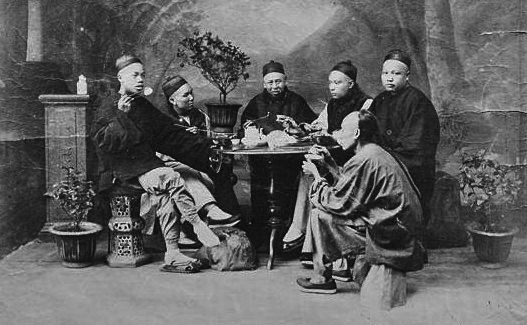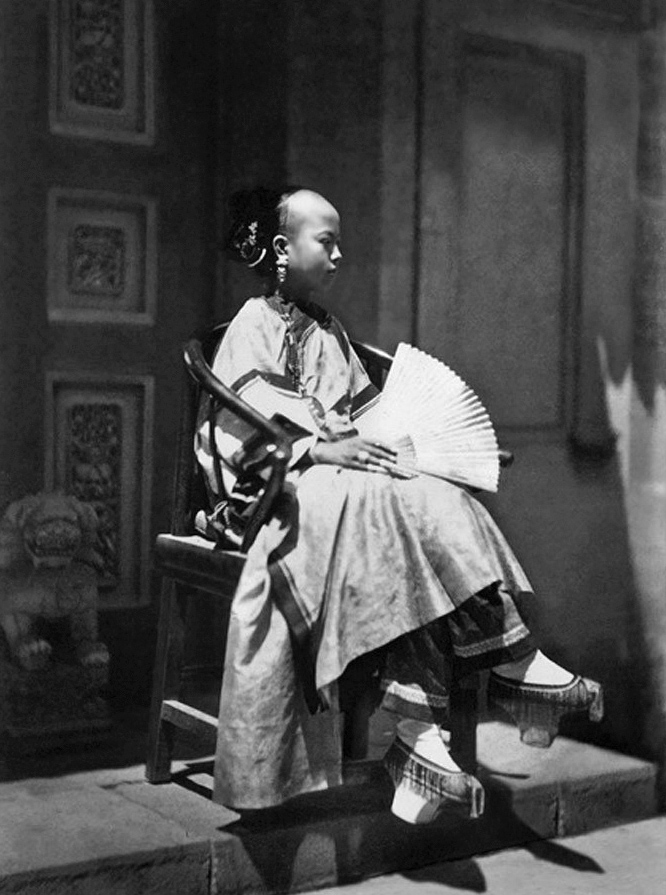Objectivity needed in historical analysis of late Qing nobility

A family dinner among male members in a noble household in the late Qing Dynasty

A banner girl of the late Qing Dynasty poses with a fan in hand.
The late Qing Dynasty witnessed simmering tensions among different political forces. By pushing strategic reforms, Manchu nobles proposed a number of “countermeasures” to facilitate the political transition. However, these “countermeasures” not only failed to generate positive results, but also dissolved nobility power and accelerated the fall of the Qing Dynasty. The behavior of late Qing nobility, to a large extent, shaped their unflattering historical portrayal.
Fall from grace
At the end of the Qing Dynasty, traditional Chinese political ethics underwent radical change. Growing public consciousness of commoners’ subjectivity in state affairs eroded nobility authority.
The Qing court’s power to pass political reforms also diminished, fueling the decline of the nobility. Nobles were either forced or took the initiative to push ahead with political reform, in a bid to preserve the monarchical political system and uphold their power.
However, these reforms backfired and nobility saw their status plummet. There was growing awareness throughout China that the Manchu regime was unreasonable. Even some Manchus argued that those of imperial lineage were not entitled to privileges.
Resorting to political reform to expand their clout, the nobility aroused controversy over their participation in politics. After the founding of the Republic of China (1912-1949), noble Manchus lost the protection of the Qing government and were reduced to commoners. It marked the beginning of a long, painful process for many Manchus stripped of their sense of superiority and relegated to the margins of society.
Imperial upheaval
Between the late years of the Qing Dynasty and early years of the Republican Era, the Chinese people began to consciously ally with all forces to further develop themselves. Traditional, narrow-minded concepts of nation broke down completely, exerting profound influence on ordinary Manchus and the aristocracy.
Since the Qing court exercised its rule through the Eight Banners system, the basic organizational framework of the Manchu society, nobles fostered a superiority complex within their political culture. However, dramatic social transformation at the end of the Qing Dynasty, featuring a surge of revolutionary activity and Han-Manchu ethnic tensions, posed huge threats to the Qing court.
Manchu nobles capitalized on Western political culture to retain their control over China. Nonetheless, their so-called “preparatory constitutionalism” turned out to be little more than wishful thinking.
Meanwhile, in the face of growing conflict between Han and Manchu people, the nobility, while resolving differences between the Han and Manchu ethnic groups, reshaping the pattern of interests, safeguarding their privileges and sustaining the rule of the Qing Empire, constituted an important force to eliminate their ethnic consciousness instead.
These measures advanced and consolidated the integration of the Chinese nation to a certain extent, positively shaping China as a modern nation state and unifying ethnic groups in the resistance against foreign aggression. However, these outcomes can be more attributed to natural progression than the explicit will of the Qing nobility.
During the epochal transition, the nobility tried to revolutionize the traditional Chinese political system in light of Western models and ideas, but what they acquired was merely a primary knowledge of the Western world and outdated political experience.
While clan interests and Confucianism were important pillars of dynastic power for the Qing court, “preparatory constitutionalism” and Manchu-Han integration were contradictory to nobles’ efforts to maintain power. As China’s evolution into a nation state gained momentum, the writing on the wall became clearer for the Qing rulers.
Negative image stereotyped
It was nobles’ incompatible actions with historical forces that led to their unfavorable depiction by their contemporaries and later generations.
In the late Qing Dynasty, China faced internal and external turmoil that resulted in progressives resenting the power-clinging royalty. Under such circumstances, a trend of “smearing” the aristocracy emerged in novels, newspapers and periodicals. The image of nobles being corrupt and incompetent became deeply rooted in people’s minds amid growing revolutionary sentiment.
Even insiders and sympathizers with the Qing court agreed that the regime was toppled because nobles held too much power.
Against such a historical background, some scholars were prone to simply classifying late Qing aristocrats as “stubborn,” “incompetent” and “corrupt,” and labeling them “conservative” and “backward” in political evaluation.
Despite widespread use of these terms, they were not derived from solid, conscientious historical studies. Rather, they were extracted from the stereotyped negative image in people’s minds since the late Qing Dynasty. Taken for granted, these impressions about late Qing aristocrats simplified history in some ways.
After the 1911 Xinhai Revolution overthrew the Qing regime, historical changes exhibited new features. However, the revolution was often regarded as a boundary in modern Chinese history between “despotism” and “republicanism.”
When the Chinese people pursued national prosperity, democracy and liberty, it was of great significance to criticize the autocratic system of the Qing Dynasty, which determined the social image of the late Qing nobility to a certain degree.
In the wave of modern democratic revolution, the aristocracy was always one of the objects for revolution due to historical accounts of them as “stubborn, conservative despots.”
Such a dim view was common and reasonable in the past, but the preconceived view had such negative influence on later historical studies that researchers would easily misinterpret late Qing nobles.
It is by no means easy to straighten out the relation between historical memory and real history. Formed social memory sometimes even becomes a presupposition in academic research, adding difficulty to change the stereotype. Historical researchers still face the daunting task to “find out basic historical truths and critically probe” the orientation of aristocrats in the late Qing Dynasty.
Zhu Wenzhe is from the National Institute for Advanced Humanistic Studies at Fudan University.
